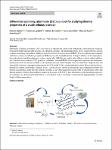Item Infomation
Full metadata record
| DC Field | Value | Language |
|---|---|---|
| dc.contributor.author | Paola Di, Matteo | - |
| dc.contributor.author | Francesca, Luziatelli | - |
| dc.contributor.author | Martina, Bortolami | - |
| dc.date.accessioned | 2023-04-20T08:42:47Z | - |
| dc.date.available | 2023-04-20T08:42:47Z | - |
| dc.date.issued | 2023 | - |
| dc.identifier.uri | https://link.springer.com/article/10.1007/s11696-022-02658-3 | - |
| dc.identifier.uri | https://dlib.phenikaa-uni.edu.vn/handle/PNK/8164 | - |
| dc.description | CC BY | vi |
| dc.description.abstract | Differential scanning calorimetry (DSC) was used as an efficient and rapid tool in studying the conformational transitions between the folded and unfolded structures of cellulolytic enzymes. The thermal properties of two crude hydrolytic enzyme cocktails containing extracellular cellulases from Trichoderma longibrachiatum DIBAF-10 were analyzed and compared with three commercial cellulase preparations. Differences in the thermal behavior of fungal cellulases in the liquid phase, freeze-dried state, liquid formulations in sodium citrate buffer (pH 4.8), and contact with cellulose, carboxymethyl cellulose, and cellobiose were evaluated. DSC profiles of cellulases from the DIBAF-10 strain provided important thermodynamic information about the thermal stability of the included proteins. Crude enzyme cocktails underwent a reproducible and irreversible exothermic aggregation phenomenon at 52.45 ± 0.90 °C like commercial β-glucosidase. | vi |
| dc.language.iso | en | vi |
| dc.publisher | Springer | vi |
| dc.subject | DSC | vi |
| dc.subject | crude cellulase cocktail | vi |
| dc.title | Differential scanning calorimetry (DSC) as a tool for studying thermal properties of a crude cellulase cocktail | vi |
| dc.type | Book | vi |
| Appears in Collections | ||
| OER - Khoa học Tự nhiên | ||
Files in This Item:

